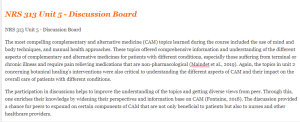NRS 313 Unit 5 – Discussion Board
NRS 313 Unit 5 – Discussion Board
The most compelling complementary and alternative medicine (CAM) topics learned during the course included the use of mind and body techniques, and manual health approaches. These topics offered comprehensive information and understanding of the different aspects of complementary and alternative medicines for patients with different conditions, especially those suffering from terminal or chronic illness and require pain relieving medications that are non-pharmacological (Maindet et al., 2019). Again, the topics in unit 2 concerning botanical healing’s interventions were also critical to understanding the different aspects of CAM and their impact on the overall care of patients with different conditions.
The participation in discussions helps to improve the understanding of the topics and getting diverse views from peer. Through this, one enriches their knowledge by widening their perspectives and information base on CAM (Fontaine, 2018). The discussion provided a chance for peers to expound on certain components of CAM that are not only beneficial to patients but also to nurses and other healthcare providers.
The content in this course builds upon previous knowledge on the pre-licensure nursing program in different yet fundamental ways.

These include expanding knowledge and skills that are relevant to practice since the use of approaches like CAM demonstrate increased leveraging of EBP in nursing practice and settings (Wells et al., 2019). Again, the content from the course is essential as it shows how one can apply patient-centered interventions to improve outcomes through effective patient engagement and participation.
Approaches that would yield additional valuable information include conducting more research, implementing some of the interventions in practice, and effective collaboration to develop evidence-based initiatives to improve patient’s health outcomes (Fontaine, 2018). The knowledge on CAM will be critical as it means increased acceptance and integration of evidence-based practice and patient-centered interventions to improve the quality of care for patients, especially those who believe in these medications.
Click here to ORDER an A++ paper from our Verified MASTERS and DOCTORATE WRITERS: NRS 313 Unit 5 – Discussion Board
NRS 313 Unit 5 – Discussion Board References
Fontaine, K. L. (2018). Complementary & Integrative Therapies for Nursing Practice 5th
Edition. Pearson.
Maindet, C., Burnod, A., Minello, C., George, B., Allano, G., & Lemaire, A. (2019). Strategies
of complementary and integrative therapies in cancer-related pain—attaining exhaustive cancer pain management. Supportive Care in Cancer, 27, 3119-3132.
DOI: 10.1007/s00520-019-04829-7.
Wells, R. E., Beuthin, J., & Granetzke, L. (2019). Complementary and integrative medicine for
episodic migraine: an update of evidence from the last 3 years. Current pain and headache reports, 23, 1-10. DOI: 10.1007/s11916-019-0750-8.
Primary Task Response: Within the Discussion Board area, write 250 words that respond to the following questions with your thoughts, ideas, and comments. This will be the foundation for future discussions by your classmates. Be substantive and clear, and use examples to reinforce your ideas.
Summative Discussion Board
Review and reflect on the knowledge that you have gained from this course. Based on your review and reflection, write at least 3 paragraphs on the following:
- What were the most compelling complementary and alternative medicine (CAM) topics learned in this course?
- How did participating in discussions help your understanding of the subject matter? Is anything still unclear that could be clarified?
- How did the content in this course build upon your prior knowledge for your pre-licensure nursing program?
- What approaches could have yielded additional valuable information?
- How will your new CAM knowledge change your future nursing practice?
The main post should include at least 1 reference to research sources, and all sources should be cited using APA format.
Responses to Other Students: Respond to at least 2 of your fellow classmates with a reply of 100–200 words about their Primary Task Response regarding items you found to be compelling and enlightening. To help you with your discussion, please consider the following questions:
- What did you learn from your classmate’s posting?
- What additional questions do you have after reading the posting?
- What clarification do you need regarding the posting?
- What differences or similarities do you see between your posting and other classmates’ postings?
NRS 313 Unit 5 – Discussion Board Rubric
The Discussion Board grading rubric is a scoring tool that represents the performance expectations for the discussion. This Discussion Board grading rubric is divided into components that provide a clear description of what should be included within each component of the discussion. It is the roadmap that can help lead your discussion. Discussion Board Grading Rubric
For assistance with your assignment, please use your text, Web resources, and all course materials.

